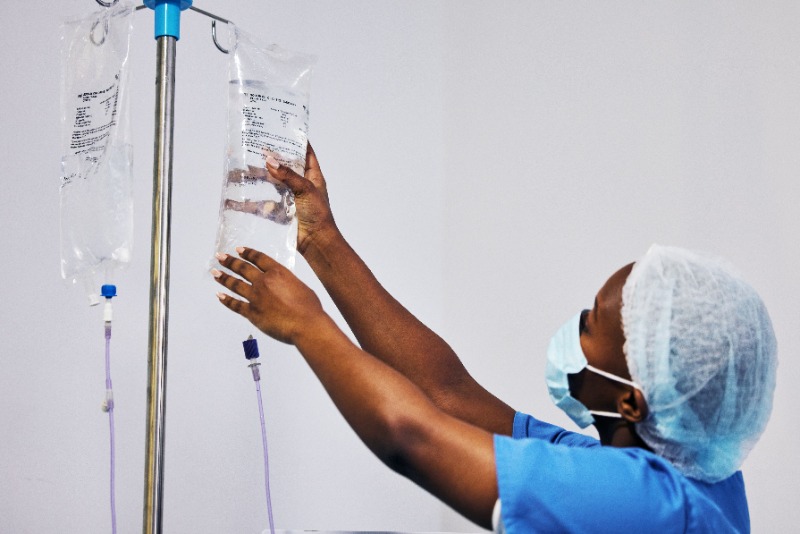According to healthcare experts, Africa has one of the weakest health systems in the world, making it prone to epidemics and outbreaks. This was evident in the 2014-2016 Ebola epidemic in West Africa, where healthcare systems were overwhelmed, and in which more than 11 000 people died in Guinea, Sierra Leone and Liberia. The World Bank estimated that the economic impact on the three countries amounted to as much as $2.8 billion.
The epidemic revealed that slow and unpredictable funding was a significant factor affecting the ability of the countries to roll out a rapid response at the beginning of the outbreak. ARC’s lead advisor for Outbreak & Epidemics, Robert Kwame Agyarko, stated publicly: “Had Ebola been identified and the response begun two months earlier, the total number of deaths could have been reduced by 80%”. An outbreak in the Democratic Republic of Congo in the same year resulted in 2 200 deaths, and while in this instance, the response was much better, there were nevertheless significant social, political, security and economic consequences.
A continent at risk

In addition to Ebola, Africa is at risk of meningitis, Marburg virus disease and Lassa fever. Meningitis occurs across an area in sub-Saharan called the meningitis belt – from Senegal in the west to Ethiopia in the east – comprising 26 countries with an estimated population of 300 million. According to the Centres for Disease Control and Prevention, this region experiences significant epidemics every 5 to 12 years, reaching 1 000 cases per population of 100 000.
Marburg virus disease, similar to Ebola, has a fatality rate of about 50%, according to the World Health Organisation, and an outbreak also heavily impacts healthcare systems and the socioeconomics of affected countries.
Lassa fever is endemic to some West African countries with an at-risk population estimated as high as 59 million, with 3 million people in Sierra Leone, Guinea and Nigeria falling ill annually and a mortality rate of 67 000. A 2022 scientific study by Scripps Research and the University of Brussels found that climate change and other environmental factors will lead to fever spreading to the central and eastern parts of Africa in the next 50 years, with the result that the number of people at risk would increase by 600%.
Ebola highlighted the critical need in Africa to insure against outbreaks and epidemics, and, amid the epidemic in 2015, African finance ministers approached ARC to develop a product that would meet this need and ensure rapid financing to help countries contain high-impact outbreaks, as well as complement the efforts of the Africa Centres for Disease Control and Prevention.
The pilot phase
In September 2017, ARC launched a pilot of its outbreaks and epidemics parametric insurance product, which would release payouts on detection of an outbreak. This would assist governments with relief funding to contain the spread, as well as deploy medical intervention without having to rely on traditional aid, which would take much longer. Early response has been documented to save more lives and prevent a worse crisis.
The product focused on severe diseases, including Ebola, Marburg virus disease and meningitis, and was to be piloted in Guinea and Uganda due to previous epidemics there. To minimise ARC’s risk exposure, an entire epidemic could not be covered, however, the cost of government response would be covered. Before the Covid-19 pandemic, ARC was poised to launch the outbreaks and epidemics product to market but was forced to hold off.
A first for Africa
In 2022, the ARC Group and its partners were able to finalise the development of this product that would provide parametric insurance to member states for high-impact epidemic risks. Four diseases were chosen with proven, high human and economic costs: Ebola, Marburg virus disease, Lassa fever and meningitis. The product will help reduce mortality, the costs of outbreak response; the indirect costs of illness (household expenditures, lost productivity); and secondary impacts on the economy (disrupted markets, lost investment, etc.).
This new peril added to ARC Ltd.’s natural disaster products is ground-breaking on the African continent, and in December, the first Outbreak and Epidemics insurance policy was issued to the government of Senegal. The maximum protection provided is US$5m. The parametric insurance product is supported by a capacity-building programme around epidemic preparedness, contingency planning for a swift and effective response, and outbreak risk modelling from simulated outbreaks.
A rapid payout will be released in the event of an outbreak of a pre-determined magnitude. Recent history has shown that the threat of unforeseen diseases, epidemics and pandemics is ever-present and always catastrophic. With Senegal leading the charge in West Africa, it is hoped that other countries will follow suit and ARC Ltd. will continue engaging with member states in this regard.
Structure of the O&E project:
• Simple transparent trigger based on case numbers reported from creditable sources; Low case numbers trigger(s) to ensure early intervention with early pay out;
• Three-year cover based on outbreak response cost needs of the country in question;
• Cat bond is issued by ARC (sponsor) to reinsurers, capital markets and donors (investors) for a premium plus coupons;
• Payout is equal to debt issue amount (principal)
• Losses occurring during basis of cover: Events occurring in coverage period;
• Single payout per cat bond tranche: each tranche pays 100% of pay out in contact when triggered:
• If trigger event occurs and the cat bond pays out, the debt is forgiven;
• Tranches of coverage per country staked at different probability of trigger thresholds.
• Total payout cap is considered for now, corresponding to single event peak exposure but covering all four pathogens. Variation to this structure can be introduced.